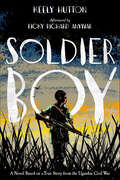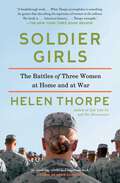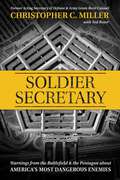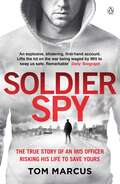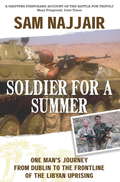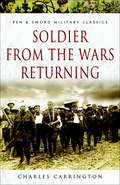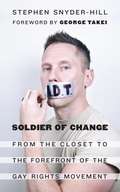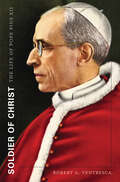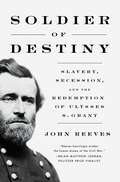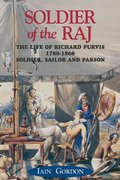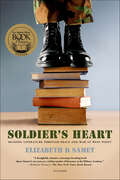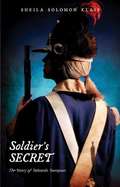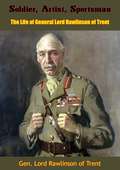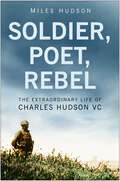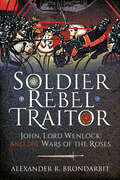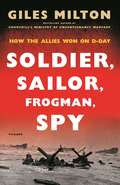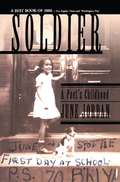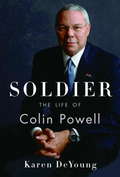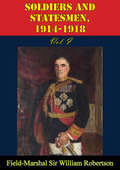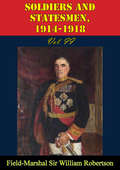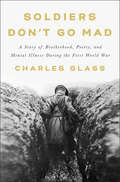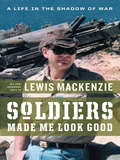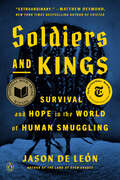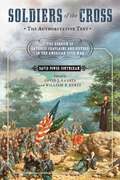- Table View
- List View
Soldier Boy: A Novel
by Keely HuttonAn unforgettable novel based on the life of Ricky Richard Anywar, who at age fourteen was forced to fight as a soldier in the guerrilla army of notorious Ugandan warlord Joseph KonySoldier Boy begins with the story of Ricky Richard Anywar, abducted in 1989 to fight with Joseph Kony's rebel army in the Ugandan civil war (one of Africa's longest running conflicts). Ricky is trained, armed, and forced to fight government soldiers alongside his brutal kidnappers, but never stops dreaming of escape. The story continues twenty years later, with a fictionalized character named Samuel, a boy deathly afraid of trusting anyone ever again. Samuel is representative of the thousands of child soldiers Ricky eventually helped rehabilitate as founder of the internationally acclaimed charity Friends of Orphans. Working closely with Ricky himself, debut author Keely Hutton has written an eye-opening book about a boy’s unbreakable spirit and indomitable courage in the face of unimaginable horror.This title has Common Core connections.
Soldier Girls: The Battles of Three Women at Home and at War
by Helen ThorpeFrom an award-winning, "meticulously observant" (The New Yorker), and "masterful" (Booklist) writer comes a groundbreaking account of three women deployed to Afghanistan and Iraq, and how their military service affected their friendship, their personal lives, and their families. <P><P> America has been continuously at war since the fall of 2001. This has been a matter of bitter political debate, of course, but what is uncontestable is that a sizeable percentage of American soldiers sent overseas in this era have been women. The experience in the American military is, it's safe to say, quite different from that of men. Surrounded and far outnumbered by men, imbedded in a male culture, looked upon as both alien and desirable, women have experiences of special interest. <P><P> In Soldier Girls, Helen Thorpe follows the lives of three women over twelve years on their paths to the military, overseas to combat, and back home ... and then overseas again for two of them. These women, who are quite different in every way, become friends, and we watch their interaction and also what happens when they are separated. We see their families, their lovers, their spouses, their children. We see them work extremely hard, deal with the attentions of men on base and in war zones, and struggle to stay connected to their families back home. We see some of them drink too much, have illicit affairs, and react to the deaths of fellow soldiers. And we see what happens to one of them when the truck she is driving hits an explosive in the road, blowing it up. She survives, but her life may never be the same again. <P><P> Deeply reported, beautifully written, and powerfully moving, Soldier Girls is truly groundbreaking.
Soldier Secretary: Warnings from the Battlefield & the Pentagon about America's Most Dangerous Enemies
by Christopher C. MillerPresident Trump's last secretary of defense shares harrowing stories of missions in Iraq and Afghanistan, gives an "important" insider look at the tumultuous final days of the administration, and issues a stark warning about the readiness of the military under President Biden (Sean Hannity). If you know one thing about Chris Miller, it's that he was President Donald Trump's final Secretary of Defense, elevated to that position in the days after the 2020 election. If you know a second thing about Chris Miller, it's that he oversaw the U.S. Armed Forces during one of the most controversial and tumultuous periods the military has experienced in decades, culminating in the shocking events at the U.S. Capitol on January 6, 2021. Yet Chris Miller is no political partisan. On the contrary, Miller has spent his adult life in the crosshairs of America's most dangerous enemies--from Middle Eastern deserts to the bowels of U.S. intelligence agencies--and emerged as one of the leading national security minds of his generation. Needless to say, Chris Miller has stories to tell. In Soldier Secretary, he reveals for the first time everything he saw--in a book that is candid, thought-provoking, and like that of no Secretary of Defense before him. This book is not just the inside story of what happened during the Trump administration--it's the inside story of what happened to America, its military, and its institutions during the two decades after September 11, 2001. Part badass, part iconoclast, Miller is an irreverent, heterodox, and always-fascinating thinker whose personal journey through war and the White House has led him to some shocking conclusions about the state of American power in 2021. With a perspective that will surprise and interest both Republicans and Democrats, Miller argues for a radical rethinking of U.S. national security strategy unlike anything since the creation of the joint armed forces in the 1980s. He offers a roadmap for how the United States can win in the era of unrestricted warfare by shedding the bloated defense bureaucracy, bringing American forces home from endless conflicts, renewing our national unity, and beating China at its own game. Miller is a true American warrior whose incredible journey from Iowa to Afghanistan to Iraq to the White House endeared him to the troops, prepared him for the unprecedented crisis of January 6, and left him deeply concerned about the future of our military and the future of our nation.
Soldier Spy
by Tom MarcusThe explosive, shocking and honest account from an MI5 officer, revealing never-before-seen detail into MI5's operation 'I do it because it is all I know. I'm a hunter of people and I'm damn good at it.' Recruited after the 7/7 attacks on London, Tom quickly found himself immersed in the tense world of watching, following and infiltrating networks of terrorists, spies and foreign agents. It was a job that took over his life and cost him dear, taking him to the limit of physical and mental endurance. Filled with extraordinary accounts of operations that saved countless lives, Soldier Spy is the only authentic account by an ex-MI5 officer of the round-the-clock battle to keep this country safe. ________ 'Very well written, gives a startling amount of operational detail, the biggest shock of all - MI5 agreed to its publication' Sunday Times 'A blistering, visceral insight into life on the front line against terror, revealed in remarkable detail' Daily Telegraph 'Startling, absolutely fascinating. A footsoldier's account out on the street.' Radio 4 'Gripping. One of the most successful MI5 undercover surveillance officers of his time' Sun
Soldier for a Summer: One Man's Journey from Dublin to the Frontline of the Libyan Uprising
by Sam NajjairHousam 'Sam' Najjair was born in Dublin to an Irish mother and a Libyan father. In June 2011, as his father's home country was being torn apart by civil war, he left Ireland on a one-way ticket to Tunisia, crossing into war-torn Libya, to join the uprising against the dictator Gaddafi.Soldier for a Summer charts his journey - from his arrival into Libya to training in the Western Mountains for twelve weeks before advancing on Tripoli. On 20 August 2011, Sam and the now famous Tripoli Brigade - a unit of the National Liberation Army of Libya - were the first revolutionaries to enter the city, and subsequently secure it and Martyrs' Square.From meeting representatives of NATO to covert operatives, arms deals, the death of his close friend and colleague, safe-houses and a captured girl sniper, this is the astounding story of how a young Irish-Libyan revolutionary became a battlefield commander of a unit of the National Liberation Army of Libya - an unforgettable account of a single season that liberated a country and transformed a young man.
Soldier from the Wars Returning (Pen & Sword Military Classics)
by Charles CarringtonSoldier from the Wars Returning is one of the truest, most profound and readable personal accounts of the Great War. The author waited nearly fifty years before writing it, and the perspective of history enhances its value. He writes only of the battles in which he participated (including the Somme and Passchendaele), though his comments on affairs beyond his knowledge at the time, through later study and reflection, are pungent and stimulating. Among other topics, he describes the politicians, the generals, Kitchener's Army, Hore-Belisha, German gas attacks, Picardy, dug-outs, tanks, the sex-life of the soldier, scrounging. trench kits and the censoring of letters. The author saw the First World War from below, as a fighting soldier in a line regiment. In the Second World War he served as a staff officer liaising between the Army and the RAF; serving two tours at RAF Bomber Command HQ at High Wycombe. This equipped him to draw forthright comparisons between the conduct of the two wars.
Soldier of Change: From the Closet to the Forefront of the Gay Rights Movement
by George Takei Stephen Snyder-HillWhen "Don't Ask, Don't Tell," the official U. S. policy on gays serving in the military, was repealed in September 2011, soldier Stephen Snyder-Hill (then Captain Hill) was serving in Iraq. Having endured years of this policy, which passively encouraged a culture of fear and secrecy for gay soldiers, Snyder-Hill submitted a video to a Republican primary debate held two days after the repeal. In the video he asked for the Republicans' thoughts regarding the repeal and their plans, if any, to extend spousal benefits to legally married gay and lesbian soldiers. His video was booed by the audience on national television. Soldier of Change captures not only the media frenzy that followed that moment, placing Snyder-Hill at the forefront of this modern civil rights movement, but also his twenty-year journey as a gay man in the army: from self-loathing to self-acceptance to the most important battle of his life--protecting the disenfranchised. Since that time, Snyder-Hill has traveled the country with his husband, giving interviews on major news networks and speaking at universities, community centers, and pride parades, a champion of LGBT equality.
Soldier of Christ: The Life of Pope Pius XII
by Robert A. Ventresca&“This well-crafted biography&” presents &“a balanced, but not uncritical, examination of the life of a controversial pope&” (Library Journal). Debates over the legacy of Pope Pius XII are so heated they are known as the &“Pius wars.&” Soldier of Christ focuses instead on Eugenio Pacelli, the flawed yet gifted man himself. While offering insight into the pope&’s response to Nazism, Robert A. Ventresca argues that it was the Cold War and Pius XII&’s manner of engaging with the modern world that defined his pontificate. Ventresca begins with the story of Pacelli&’s Roman upbringing, his intellectual formation in Rome&’s seminaries, and his interwar experience as papal diplomat and Vatican secretary of state. Accused of moral equivocation during the Holocaust, Pius XII later fought the spread of Communism, spoke against the persecution of Catholics, and tackled a range of social and political issues. By appointing the first indigenous cardinals from China and India and expanding missions in Africa, he internationalized the church&’s membership and moved Catholicism beyond the colonial mentality of previous eras. Drawing from a diversity of international sources, including unexplored documentation from the Vatican, Ventresca reveals a paradoxical figure: a prophetic reformer of limited vision whose leadership both stimulated the emergence of a global Catholicism and sowed doubt and dissension among some of the church&’s most faithful servants.
Soldier of Destiny: Slavery, Secession, and the Redemption of Ulysses S. Grant
by John ReevesPresenting an original, thought-provoking look at Ulysses S. Grant, Soldier of Destiny evokes the life of the general through his conflicted connection to slavery, allowing readers a clearer understanding of this great American. Captain Ulysses S. Grant, an obscure army officer who was expelled for alcohol abuse in 1854, rose to become general-in-chief of the United States Army in 1864. What accounts for this astonishing turn-around during this extraordinary decade? Was it destiny? Or was he just an ordinary man, opportunistically benefiting from the turmoil of the Civil War to advance to the highest military rank? Soldier of Destiny reveals that Grant always possessed the latent abilities of a skilled commander—and he was able to develop these skills out West without the overwhelming pressure faced by more senior commanders in the Eastern theater at the beginning of the Civil War. Grant was a true Westerner himself and it was his experience in the West—before and during the Civil War—that was central to his rise. From 1861 to 1864, Grant went from being ambivalent about slavery to becoming one of the leading individuals responsible for emancipating the slaves. Before the war, he lived in a pro-slavery community near St. Louis, where there were very few outright abolitionists. During the war, he gradually realized that Emancipation was the only possible outcome of the war that would be consistent with America&’s founding values and future prosperity. Soldier of Destiny tells the story of Grant&’s connection to slavery in far more detail than has been done in previous biographies. Grant&’s life story is an almost inconceivable tale of redemption within the context of his fraught relationships with his antislavery father and his slaveholding wife. This narrative explores the poverty, inequality, and extraordinary vitality of the American West during a crucial time in our nation&’s history. Writers on Grant have tended to overlook his St. Louis years (1854-1860), even though they are essential for understanding his later triumphs. Walt Whitman described Grant as &“a common trader, money-maker, tanner, farmer of Illinois—general for the republic, in its terrific struggle with itself, in the war of attempted secession. Nothing heroic, as the authorities put it—and yet the greatest hero. The gods, the destinies, seem to have concentrated upon him.&”
Soldier of the Raj: The Life of Richard Purvis, 1789–1869: Soldier, Sailor and Parson (19th Century Ser.)
by Iain GordonA meticulously researched biography of a young officer in the early part of the 19th Century. The son of an admiral, Richard Purvis went to sea in Nelson's Navy at the age of 11 before being commissioned at the age of 15 into the Bengal Army, part of the great East India Company. He went on to serve 17 years in India before returning to become a country parson.The emphasis of this book is on his Indian military service, with the story told largely through an extensive collection of previously unpublished contemporary letters. These give a unique and intimate insight into the daily lives, difficulties, ethos and humour of young British officers in India during the Napoleonic period. There was, of course, danger and action too and Purvis's role in the Nepal War is described. Patronage was also a feature of a young ambitious man's life during the Georgian period and the workings of this are fascinatingly revealed.
Soldier's Heart: Reading Literature Through Peace and War at West Point
by Elizabeth D. SametElizabeth D. Samet and her students learned to romanticize the army "from the stories of their fathers and from the movies." For Samet, it was the old World War II movies she used to watch on TV, while her students grew up on Braveheart and Saving Private Ryan. Unlike their teacher, however, these students, cadets at the United States Military Academy at West Point, have decided to turn make-believe into real life.West Point is a world away from Yale, where Samet attended graduate school and where nothing sufficiently prepared her for teaching literature to young men and women who were training to fight a war. Intimate and poignant, Soldier's Heart chronicles the various tensions inherent in that life as well as the ways in which war has transformed Samet's relationship to literature. Fighting in Iraq, Samet's former students share what books and movies mean to them—the poetry of Wallace Stevens, the fiction of Virginia Woolf and J. M. Coetzee, the epics of Homer, or the films of James Cagney. Their letters in turn prompt Samet to wonder exactly what she owes to cadets in the classroom.Samet arrived at West Point before September 11, 2001, and has seen the academy change dramatically. In Soldier's Heart, she reads this transformation through her own experiences and those of her students. Forcefully examining what it means to be a civilian teaching literature at a military academy, Samet also considers the role of women in the army, the dangerous tides of religious and political zeal roiling the country, the uses of the call to patriotism, and the cult of sacrifice she believes is currently paralyzing national debate. Ultimately, Samet offers an honest and original reflection on the relationship between art and life.
Soldier's Secret: The Story of Deborah Sampson
by Sheila Solomon KlassA woman living in Colonial America, Deborah Sampson wanted more from life. When the colonies went to war with the British in 1775, Deborah disguised herself in a man's uniform and served in the Continental army for more than a year.
Soldier, Artist, Sportsman: The Life of General Lord Rawlinson of Trent
by Gen. Lord Rawlinson of Trent Gen. Tasker H. Bliss Maj.-Gen. Sir Frederick MauriceFirst published in 1928, taken from his own journals and letters, this biography traces General Lord Rawlinson’s life, from his service with Kitchener to his post-war posting to India.“On the grounds that Lord Rawlinson’s journals show us in his own words the development of his mind, and the reasons for his actions at the time of action, better than I could show forth these things in my words, I determined to take the responsibility of making the journals the basis of the story of his life.”—Maj.-Gen. Sir Frederick Maurice
Soldier, Poet, Rebel: The Extraordinary Life of Charles Hudson VC
by Miles HudsonCharles Hudson VC was one of the twentieth century's outstanding fighting soldiers. His military career through two world wars and in Russia in 1919 earned him a host of medals. He was also a man of deep feeling, an accomplished poet and, in many ways, a rebel. In this compelling biography, the author skilfully interweaves his own narrative insight with his father's wartime journals and other unpublished material. The narrative includes detailed personal descriptions of the Battle of the Somme and other actions. It recounts the authoress Vera Brittain's bitter reaction to the death of her brother Edward when under Hudson's command in Italy in 1918 and tells how Hudson, out of compassion for her feelings, did not reveal the truth until he met her in 1934. It tells of the extraordinary affair in the summer of 1940, when the Secretary of State for War, Anthony Eden, asked a meeting of senior army commanders in the then beleaguered Britain whether, in the event of a successful German invasion, their soldiers would agree to be evacuated to Canada or whether they would insist on going home to support their families. The author examines Hudson's motivation in both wars and delves deeply into his complex, and highly courageous, character.
Soldier, Rebel, Traitor: John, Lord Wenlock and the Wars of the Roses
by Alexander R. BrondarbitJohn Wenlock, first Lord Wenlock, was a leading diplomat, courtier and soldier during the Wars of the Roses whose remarkable career offers us a fascinating insight into one of the most turbulent periods in English medieval history. And yet he has hitherto been overshadowed by his more illustrious contemporaries. Alexander Brondarbit’s meticulously researched and perceptive biography is overdue. It establishes Wenlock as a major figure in his own right and records in vivid detail how this shrewd nobleman found his way through the brutal conflicts of his times. Wenlock served in Henry V’s military campaigns in France in the 1420s before moving on to a career in the royal households of Henry VI, Margaret of Anjou and Edward IV. As a diplomat, he led multiple embassies to Burgundy and France and, in addition to the kings he served, he was closely connected with other notable figures of the age such as Richard Neville, earl of Warwick. But Wenlock’s speciality was on the battlefield – he took part in many raids, skirmishes and sieges and in three major battles including the Battle of Tewkesbury in 1471 where he lost his life. Using primary sources as well as contemporary assessments in chronicles and letters, Alexander Brondarbit gives a nuanced description of the main episodes in Wenlock’s long career and throws new light on the motivation of a man who has been labelled a ‘Prince of Turncoats’ because of his frequent changes of allegiance.
Soldier, Sailor, Frogman, Spy, Airman, Gangster, Kill or Die: How the Allies Won on D-Day
by Giles MiltonA ground-breaking account of the first 24 hours of the D-Day invasion told by a symphony of incredible accounts of unknown and unheralded members of the Allied – and Axis – forces.An epic battle that involved 156,000 men, 7,000 ships and 20,000 armoured vehicles, D-Day was, above all, a tale of individual heroics – of men who were driven to keep fighting until the German defences were smashed and the precarious beachheads secured. This authentic human story – Allied, German, French – has never fully been told.Giles Milton’s bold new history narrates the events of June 6th, 1944 through the tales of survivors from all sides: the teenage Allied conscript, the crack German defender, the French resistance fighter. From the military architects at Supreme Headquarters to the young schoolboy in the Wehrmacht’s bunkers, Soldier, Sailor, Frogman, Spy, Airman, Gangster, Kill or Die lays bare the absolute terror of those trapped in the front line of Operation Overlord. It also gives voice to those who have hitherto remained unheard – the French butcher’s daughter, the Panzer Commander’s wife, the chauffeur to the General Staff. This vast canvas of human bravado reveals “the longest day” as never before – less as a masterpiece of strategic planning than a day on which thousands of scared young men found themselves staring death in the face. It is drawn in its entirety from the raw, unvarnished experiences of those who were there.
Soldier: A Poet's Childhood
by June JordanWritten with exceptional beauty throughout, Soldier stands and delivers an eloquent, heart-breaking, hilarious and hopeful, witness to the beginnings of a truly extraordinary, American life.
Soldier: The Life of Colin Powell
by Karen DeyoungOver the course of a lifetime of service to his country, Colin Powell became a national hero, a beacon of wise leadership and, according to polls, "the most trusted man in America. " From his humble origins as the son of Jamaican immigrants to the highest levels of government in four administrations, he helped guide the nation through some of its most heart-wrenching hours. Now, in the first full biography of one of the most admired men of our time, award-winning Washington Post journalist Karen DeYoung takes us from Powell's Bronx childhood and meteoric rise through the military ranks to his formative roles in Washington's corridors of power and his controversial tenure as secretary of state. With psychological acumen and a reporter's eye for detail, DeYoung introduces us to the racially integrated neighborhood where Powell grew up, his courtship of and marriage to Alma Johnson, and his years as a promising young Army officer. We are witness to the pivotal events that helped shaped his world view, including two tours of duty in Vietnam, where he was disillusioned by a breakdown in leadership and the lack of a clear objective, and a 1988 meeting as President Reagan's national security adviser with Mikhail Gorbachev, who looked at him dead-on and effectively declared an end to the Cold War. We are privy to his reasoning as the architect of Operation Desert Storm and the chairman of the Joint Chiefs of Staff under George H. W. Bush and Bill Clinton, a position that made him a household name and an international celebrity. And we experience his agonizing deliberations in the face of a groundswell of public desire that he run for the presidency. Yet it was his capacity as America's chief diplomat in the administration of George W. Bush that brought Powell the most renown--and criticism. Charged with the formidable task of making the case for war with Iraq, he convinced a wary nation that it was both necessary and right, only to find his own credibility hanging in the balance as the justification for invasion began to unravel. At odds with the White House on a range of foreign policy issues, Powell's counsel went unheeded and his reputation was tarnished. With dramatic new information about the inner workings of an administration locked in ideological combat, DeYoung makes clearer than ever before the decision-making process that took the nation to war and addresses the still-unanswered questions about Powell's departure from his post shortly after the 2004 election. Drawing on interviews with U. S. and foreign sources as well as with Powell himself, and with unprecedented access to his personal and professional papers, Soldier is a revelatory portrait of an American icon: a man at once heroic and all-too-humanly fallible.
Soldiers And Statesmen, 1914-1918 Vol. I (Soldiers And Statesmen, 1914-1918 #1)
by Field-Marshal Sir William RobertsonSir William "Wully" Robertson was the first (and only) man to rise from the lowliest rank of private soldier to the highest rank of Field Marshal within the British Army. Determined, strong-willed and militarily conservative he served ably in field and staff positions in India and South Africa; always chary of wasting his men's lives. When the First World War broke out he sailed with the BEF in 1914 as quartermaster-general but was promoted to the post of chief of the Imperial General Staff in 1915. A staunch "westerner" who believed that the war could only be won in France and Flanders by knocking the German army out of the war, he faced many amateur strategists who wanted to squander resources in other theatres. By 1918 he resigned his post in disgust at the policies of David Lloyd George who refused to reinforce Sir Douglas Haig in France precipitating the German breakthroughs of the spring and summer.From the very start of the war Robertson was at the hub of the action at the highest levels of the British war effort; in these two volumes he reveals the decisions and struggles that shaped that strategy. Filled with the opinion of the "westerner" school of thought; through the pages Robertson despairs at the Gallipoli invasion, sets against the Salonika disaster and fumes at the civilian members of the war cabinet and the "Supreme War Council". Written a short time after the war with it all fresh and even with some bad feeling in mind these two volumes are essential to the History of the First World War.
Soldiers And Statesmen, 1914-1918 Vol. II (Soldiers And Statesmen, 1914-1918 #2)
by Field-Marshal Sir William RobertsonSir William "Wully" Robertson was the first man to rise from the lowliest rank of private soldier to the highest rank of Field Marshal within the British Army. Determined, strong-willed and militarily conservative he served ably in field and staff positions in India and South Africa; always chary of wasting his men's lives. When the First World War broke out he sailed with the BEF in 1914 as quartermaster-general but was promoted to the post of chief of the Imperial General Staff in 1915. A staunch "westerner" who believed that the war could only be won in France and Flanders by knocking the German army out of the war, he faced many amateur strategists who wanted to squander resources in other theatres. By 1918 he resigned his post in disgust at the policies of David Lloyd George who refused to reinforce Sir Douglas Haig in France precipitating the German breakthroughs of the spring and summer.From the very start of the war Robertson was at the hub of the action at the highest levels of the British war effort; in these two volumes he reveals the decisions and struggles that shaped that strategy. Filled with the opinion of the "westerner" school of thought; through the pages Robertson despairs at the Gallipoli invasion, sets against the Salonika disaster and fumes at the civilian members of the war cabinet and the "Supreme War Council". Written a short time after the war with it all fresh and even with some bad feeling in mind these two volumes are essential to the History of the First World War.
Soldiers Don't Go Mad: A Story of Brotherhood, Poetry, and Mental Illness During the First World War
by Charles GlassA brilliant and poignant history of the friendship between two great war poets, Siegfried Sassoon and Wilfred Owen, alongside a narrative investigation of the origins of PTSD and the literary response to World War IFrom the moment war broke out across Europe in 1914, the world entered a new, unparalleled era of modern warfare. Soldiers faced relentless machine gun shelling, incredible artillery power, flame throwers, and gas attacks. Within the first four months of the war, the British Army recorded the nervous collapse of ten percent of its officers; the loss of such manpower to mental illness – not to mention death and physical wounds – left the army unable to fill its ranks. Second Lieutenant Wilfred Owen was twenty-four years old when he was admitted to the newly established Craiglockhart War Hospital for treatment of shell shock. A bourgeoning poet, trying to make sense of the terror he had witnessed, he read a collection of poems from a fellow officer, Siegfried Sassoon, and was impressed by his portrayal of the soldier&’s plight. One month later, Sassoon himself arrived at Craiglockhart, having refused to return to the front after being wounded during battle.Though Owen and Sassoon differed in age, class, education, and interests, both were outsiders – as soldiers unfit to fight, as gay men in a homophobic country, and as Britons unwilling to support a war likely to wipe out an entire generation of young men. But more than anything else, they shared a love of the English language, and its highest expression of poetry. As their friendship evolved over their months as patients at Craiglockhart, each encouraged the other in their work, in their personal reckonings with the morality of war, as well as in their treatment. Therapy provided Owen, Sassoon, and fellow patients with insights that allowed them express themselves better, and for the 28 months that Craiglockhart was in operation, it notably incubated the era&’s most significant developments in both psychiatry and poetry.Drawing on rich source materials, as well as Glass&’s own deep understanding of trauma and war, Soldiers Don't Go Mad tells for the first time the story of the soldiers and doctors who struggled with the effects of industrial warfare on the human psyche. Writing beyond the battlefields, to the psychiatric couch of Craiglockhart but also the literary salons, halls of power, and country houses, Glass charts the experiences of Owen and Sassoon, and of their fellow soldier-poets, alongside the greater literary response to modern warfare. As he investigates the roots of what we now know as post-traumatic stress disorder, Glass brings historical bearing to how we must consider war&’s ravaging effects on mental health, and the ways in which creative work helps us come to terms with even the darkest of times.
Soldiers Made Me Look Good
by Lewis MackenzieSince retiring from the Armed Forces, Major-General Lewis MacKenzie has not stayed out of the spotlight but continues to speak his mind. In this straight-talking memoir, he traces his post-military career as an international commentator on military affairs, a consultant to the Irish government and a federal political candidate.In Soldiers Made Me Look Good he answers his critics, including journalist Carol Off for her criticism of his handling of the UN mission in Bosnia. In a hard-hitting chapter, he discusses his professional disagreement with the leadership priorities demonstrated by Roméo Dallaire in the early hours of the Rwandan genocide. He continues his story to the present, to "the first real litmus test for NATO"-Afghanistan.Divided into two parts-pre-1993, when MacKenzie calls himself a Cold War grunt, and post-1993, after his controversial stint in Bosnia-Soldiers Made Me Look Good is laced with anecdotes both funny and profound. It concludes with ten pointers on leadership, in which MacKenzie shares hard-earned insights from a life on the front lines.
Soldiers and Kings: Survival and Hope in the World of Human Smuggling
by Jason De León&“A work of extraordinary reportage and compassion...[it] will shock you, move you, and leave you changed.&”—Matthew Desmond, Pulitzer Prize-winning and New York Times bestselling author of Evicted and Poverty, by America&“An enlightening, frightening, unforgettable read.&”—Sandra Cisneros, bestselling author of The House on Mango StreetAn intense, intimate and first-of-its-kind look at the world of human smuggling in Latin America, by a MacArthur "genius" grant winner and anthropologist with unprecedented accessPolitical instability, poverty, climate change, and the insatiable appetite for cheap labor all fuel clandestine movement across borders. As those borders harden, the demand for smugglers who aid migrants across them increases every year. Yet the real lives and work of smugglers—or coyotes, or guides, as they are often known by the migrants who hire their services—are only ever reported on from a distance, using tired tropes and stereotypes, often depicted as boogie men and violent warlords. In an effort to better understand this essential yet extralegal billion dollar global industry, internationally recognized anthropologist and expert Jason De León embedded with a group of smugglers moving migrants across Mexico over the course of seven years.The result of this unique and extraordinary access is SOLDIERS AND KINGS: the first ever in-depth, character-driven look at human smuggling. It is a heart-wrenching and intimate narrative that revolves around the life and death of one coyote who falls in love and tries to leave smuggling behind. In a powerful, original voice, De León expertly chronicles the lives of low-level foot soldiers breaking into the smuggling game, and morally conflicted gang leaders who oversee rag-tag crews of guides and informants along the migrant trail. SOLDIERS AND KINGS is not only a ground-breaking up-close glimpse of a difficult-to-access world, it is a masterpiece of narrative nonfiction.
Soldiers of Evil: The Commandants of the Nazi Concentration Camps
by Haim Watzman Tom SegevProfiles some of the men responsible for the running of the Concentration Camps.
Soldiers of the Cross, the Authoritative Text: The Heroism of Catholic Chaplains and Sisters in the American Civil War
by David Power Conyngham&“Students of the Civil War, Catholic history, and women&’s history, among others, will welcome [Soldiers of the Cross] . . . Brilliantly edited.&” —Randall M. Miller, co-editor of Religion and the American Civil War Shortly after the Civil War, an Irish Catholic journalist and war veteran named David Power Conyngham began compiling the stories of Catholic chaplains and nuns who served during the conflict. His manuscript, Soldiers of the Cross, is the fullest record written during the nineteenth century of the Catholic Church&’s involvement in the Civil War, as it documents the service of fourteen chaplains and six female religious communities, representing both North and South. Many of Conyngham&’s chapters contain new insights into the clergy during the war that are unavailable elsewhere, either during his time or ours, making the work invaluable to Catholic and Civil War historians. The introduction contains over a dozen letters written between 1868 and 1870 from high-ranking Confederate and Union officials, such as Confederate General Robert E. Lee, Union Surgeon General William Hammond, and Union General George B. McClellan, who praise the church&’s services during the war. Chapters on Fathers William Corby and Peter P. Cooney, as well as the Sisters of the Holy Cross, cover subjects relatively well known to Catholic scholars, yet other chapters are based on personal letters and other important primary sources that have not been published prior to this book. Due to Conyngham&’s untimely death, Soldiers of the Cross remained unpublished, hidden away in an archive for more than a century. Now annotated and edited so as to be readable and useful to scholars and modern readers, this long-awaited publication of Soldiers of the Cross is a fitting presentation of Conyngham&’s last great work
